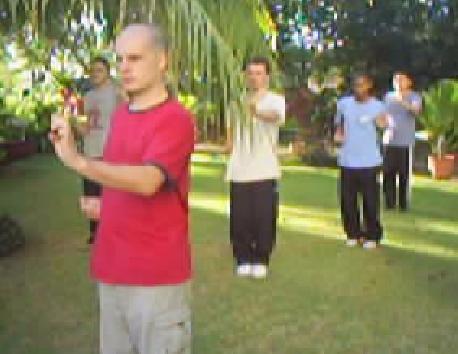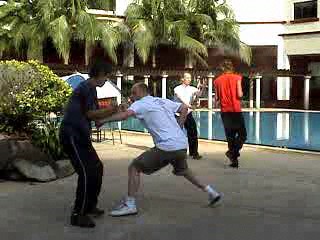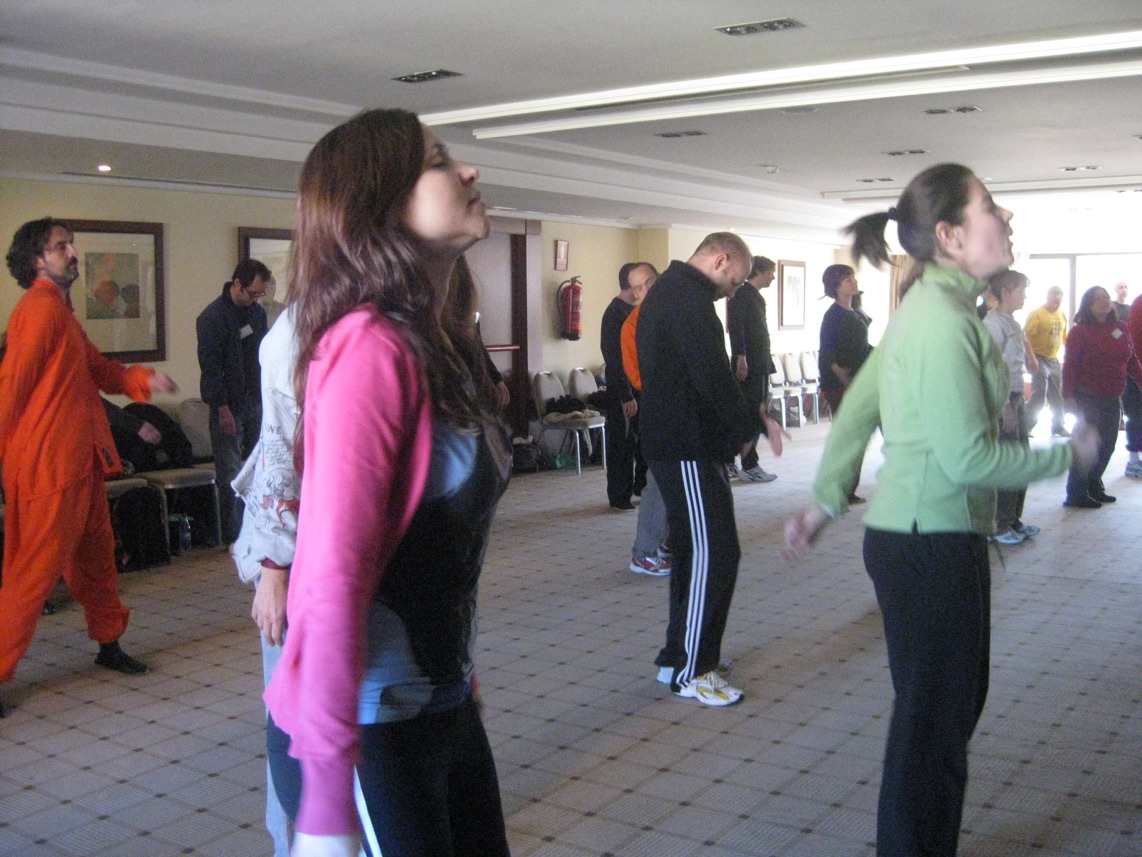SELECTION OF QUESTIONS AND ANSWERS
APRIL 2017 PART 2

"One-finger Shooting Zen" is an excellent method to develop internal force
Question 1
Sifu, I don't mean to bring up unpleasant memories but there are some instructors in our school who are much higher than me who have left. My greatest fear is that if I have more awe, wonder and heavenly-glory, I would become filled with pride and arrogance.
I would rather stop now, forsaking all that future awe and wonder rather than be one that walks away from my sifu. Perhaps my thinking is wrong. If so, I humbly ask you to correct my understanding.
The power at the Legacy of Zhang San Feng course was immense. I'm sure two of the chief instructors who have left experienced something similar too. What if they told themselves, "I will never leave Sifu."
— John, France
Editorial Note: John's questions were asked soon after the Intensive Zen Course in Ireland in February 2016, but because of a long waiting list, they are only posted now.
Answer
You have done very well in both the Zen course and the San Feng Wudang course in Ireland. Your preparation for the San Feng Wudang course paid off very well.
A great prevention against any practitioner turning his back against his teacher is the first Shaolin Law, especially respecting the master. If one follows this law sincerely, he will never leave his teacher.
The two instructions you mentioned actually haven't reached very high levels in their arts, although they think they have, and they are high-level compared to most other world known masters today. It is the first time I am stating this fact, though I suspect some in our Shaolin Wahnam Family may have guessed at it.
The first instructor you mentioned, despite his reputation for sparring, could be beaten by many instructors and even students in our school. In fact, in one intensive course he was no match against another instructor. who was not particularly known for sparring In one regional course, he was so inadequate in his sparring (according to our Shaolin Wahnam level) that instead of missing the opportunity I showed him what he should do, though I normally won't do that in front of students.
The other instructor left our school because he thought that he could make much money promoting chi kung in the internet in a way deviated from the policy of our school. I would not stop anyone from making money the way he thought fit, unless it was clearly immoral, and in his case it was not immoral though it was different from the philosophy of our school.
The two instructors were made chief instructor of their respective country because I followed tradition. They were the most senior at the time.
Coming back to the point why I don't consider many world known masters as real masters, though I still refer to them as masters due to respect, is because, strictly speaking, they are not even practitioners of their arts. Many world known kungfu "masters" cannot use their kungfu for combat, and many world known chi kung "masters" have no experience of chi.
Question 2
Just now I felt so emotional. I interrupted typing this email to go into my living room and prostrate to Immortal Li (I have his picture on the wall) and I prayed, "May I never betray Sifu, May I always respect Sifu, May I never turn my back on Sifu."
Answer
We are all very thankful to Immortal Li. Personally, Immortal Li has helped me and my family very much, for which I am forever grateful. Immortal Li is also instrumental for the founding of our school, which you probably have read in my autobiography.

Training combat sequences and applying them in free sparring is an effective way to train combat efficiency
Question 3
Sifu, can I ask you for some more tips for practicing alone without a partner? I've never done push-hands or done pair-work like at the Legacy of Zhang San Feng course.
Answer
You can be combat efficient even without a training partner in your normal practice, but after you have learned combat application with living partners in courses with me. Develop your internal force, which you already have much, and practice your combat sequences well, which you intend to do. When you meet other martial artists in free sparring who are at your level or even slightly above your level, apply your combat sequences relentlessly on them, taking care of your safety-first.
As I explained in Ireland, you have become so skilful in your combat sequences that your opponents just have time trying to escape your attack. Secondly, there is little or no martial art in the level of free sparring today. It is just an exchange of blows, without attempts to defend themselves. Generally, the one who is willing to take blows and rush at his opponent regardless of the blows that land on him, as long as he is not seriously injured or killed by the blows, he would win.
Thirdly, and I am saying this honestly without meaning to be disrespectful to other martial artists, most martial artists do not have the defence to your attack. If you kick at a Boxer, grip a Karateka, or fell a Taekwondo exponent, for example, they have no techniques in their art to counter you. Kungfu exponents would have learned the counter techniques in solo practice, but they do not know their combat application. If they do, they only know it in theory, they do not have the skills to apply them in combat.
Joan has planned to have a course on Pushing Hands in 2017. It will be very beneficial to all kungfu practitioners, particularly Taijiquan practitioners.
Question 4
Sifu, will it be easier to achieve flexibility now that I've had a breakthrough with internal force and Taijiquan? Can I practice Three Levels to the Ground? One of my dreams was always to have that flexibility.
The night you came to Korea, you confirmed for me at the time that my third-eye opened. It felt like a piece of silver thread unraveling in a cool breeze. During the Zen course a few days ago, I felt like two bolts of lightning in my third-eye. One bolt of lightning from the left, one from the right and they met in the middle. I felt a similar 'lightning' sensation in my spine. It felt like my whole being was being re-wired and re-programmed.
Answer
Yes, as you have some breakthroughs with internal force and Taijiquan, it is easier now to achieve flexibility. Practicing Three Levels to the Ground is excellent for you.
Congratulations for having your third eye opened. Always use it beneficially.

Dr Foong teaching chi kung at the Holistic Health Cultiation Centre
Question 5
I wish to confirm with Sifu on some matter of chi kung healing. Some time ago a student told me she could not move her hands. She took a CT scan and doctors informed her of a very, very mild stroke. They asked her not to do any heavy exercise and warned her to be very careful as there could be another stroke in the future.
I told her that was part of cleansing and she needed not be alarmed, but continued to enjoy her chi kung practice and live a normal life, do whatever she enjoyed doing, and stop worrying. Now she is well and back to normal.
An elderly student over 80 years old had a minor stroke and was hospitalized. Again I told him it was part of cleansing and had he not been practicing chi kung the stroke could be very serious, and might even be fatal. While he was in the hospital I sent chi to him for two days. His recovery was very fast and he was discharged within 3 days.
He came to my center for chi kung healing. This morning I did a session for him. Before the chi kung healing he was on a wheel chair and not able to move his right hand and leg, was tired, and not alert. I opened his energy points and transmit some chi to him. After the session he could move his hands, legs and even walk a few steps while he became more alert.
While I have been telling people that practicing chi kung should keep us healthy and can overcome sickness, often people asked me why whenever something happens, we always say it is "cleansing" or "reminiscent period" or "healing crisis ". It is like becoming an excuse. I told them cleansing could be over many years, and had a person not been practicing chi kung he or she could have serious problems. May be Sifu can help to provide some further in-depth explanation.
— Dr Foong, Director of Holistic Health Cultivation Centre, Malaysia
Answer
You are right in saying that if a person had not practiced our chi kung, the illness, like a stroke, could be more serious, or even fatal.
Yes, cleansing can happen at different levels. It is not an excuse when we tell students about cleansing, and warn them about over-training which can lead to over-cleansing. As our chi kung is very powerful, our students must seriously guard against over-training.
In the phenomenal world, cleansing can occur at three levels -- the level of health, the level of vitality, and the level of longevity.
Suppose the threshold for health is 30% of the performance of all his organs and systems. If he is performing at 25%, he is sick. The first level of cleansing is that of health. If he clenses off 5% of his blockage, he will be healthy again.
A person working at only 30% of his performance is not full of vitality though he may not be clinically sick. So the next level of cleansing is that of vitality. If he can cleanses off 20% of his blockage, working at 50% of his performance, he has vitality. If he cleanses of another 10%, i.e. working at 60%, he has more vitality.
However, a person working at 60% of his performance may have vitality, but not necessarily longevity. If he cleanses off another 30% of his blockage, i.e. he works at 90% of his performance, he will not only have good health and vitality but also longevity.
If a student practices our chi kung conscientiously, he will have good health, vitality and longevity as a matter of course. But as a matter of fact, he may not have these wonderful benefits.
The difference between a matter of course and a matter of fact is as follows. When people drive along the highway from Kuala Lumpur to Penang, arriving at Penang is a matter of course. As a mater of act, some persons may not arrive if, for example, they stop driving or they go elsewhere off the highway.
There are three main categories of reasons why people practicing our chi kung may not have good health, vitality and longevity:
- They over-train.
- They train wrongly.
- They stop their training.
In our school, wrong training is not an issue. However, some student may train wrongly if they worry or intellectualize unnecessarily. They should not worry or intellectualize even if they realize they have made some mistakes due to carelessness or forgetfulness. They just enjoy their practice. Their subsequent chi flow will more than enough overcome any harm that they may have unwittingly caused due to their carelessness or forgetfulness.
Stopping their practice will cause them not to have the chi kung benefits. Some students may practice regularly for a few weeks, then they stop, which is quite silly as they enjoy our chi kung benefits. As our chi kung is very powerful, they need to practice only for about 10 minutes a session, even once a day, at about 30% of their potential.
Question 6
Is it true that transmitting chi to patients from a distance is more energy draining than patients in front of us. After sending chi to the elderly patient the second time, I feel very tired. I often send chi to patients in front of me and I am fine.
Sifu, is there any other training method to improve my energy level besides the chi kung, kungfu and the "Iron Bridge" which I do almost every day? Or is the training I am doing is fine and sufficient, and I let time take it course to improve further of my energy level?
Answer
Distant chi transmission is very draining. At the most, you should not perform more than 50% of your potential, i.e. when you begin to feel tired, which is nature's way of telling you to stop.
Your routine is correct. However, you should guard against over-training. Over-training involves depth, not breath. In other words, a practitioner may practice 10 different types of art at a relatively low level, yet not over-train. He may over-train if he practices only one art at a high level.

Perform suitable chi kung techniques for "you-wei", then enjoy a chi flow for "wi-wei"
Question 7
As you often highlight how important it is to always have good thoughts, how can we best deal with habitual negative thinking, worrying and intellectualizing in our daily life, as we are becoming more conscious of ourselves and of our thinking, so that we do not become stressed about the amount of negative thoughts, but are able to gradually change our thoughts for better and let go of those that do not serve us?
— Sifu Nessa Kahila, Finland
Answer
It is simple, though it may not be easy. Just do it.
Let us take an example.
Suppose you are going to eat your breakfast. Just eat your breakfast, and enjoy it, instead of thinking how you are going to eat your breakfast, when you are going to eat your breakfast, or whether you should eat your breakfast.
Let us take another example.
Suppose you are going to put on a beautiful blue dress. Just put on the beautiful blue dress, and enjoy doing it, instead of thinking why you are going to put on a beautiful blue dress, when you are going to put on a beautiful blue dress, or whether you should put on a red dress instead.
Now, you are going to have good thoughts. Just do it, i.e. have good thoughts, and enjoy doing it, instead of thinking how to deal with negative thoughts, when you should worry about your daily life, and how you could intellectualize about becoming more conscious of yourself.
If you just follow this simple advice, i.e.just have good thoughts, you will find you will not become stressed, and are able to change your thoughts for better and let go of those thoughts that do not serve you.
Question 8
To me it seems that smiling from the heart and to forgive oneself and others are two very important skills connected to the heart and to the liver. Are there other fundamental skills connected to other organs, like letting go of fear or being more balanced connected to kidneys and spleen?
— Bernhard, Austria
Answer
Many students have told me that smiling from the heart and to forgive oneself and others are the two best exercises they have learnt in our school.
Both these two exercises are connected with the heart, which refers not just to the organ heart, but to the mind or spirit. Some cultures refer to the heart here as the soul. Modern science refers to it as the consciousness.
The emotions related to internal organs are as follows:
joy -- heart
anger -- liver
anxiety -- spleen
sorrow -- lung
fear -- kidneys
Chi kung is excellent for developing skills to work on these emotions and organs. You can perform any chi kung exercise to generate an energy flow. The energy flow will work on the respective organs or relevant parts of your body to clear negative emotions. If you are already emotionally healthy, your energy flow will strengthen the respective organs resulting in positive emotions.
If you have fear, you may try letting go of fear. If you find your kidney or spleen energy is unbalanced, you may try balancing it by various means, like taking appropriate herbs. But these methods are not as effective as practicing chi kung.
When you practice chi kung, God does the necessary work for you. But first you must help God to help yourself. It is expressed in Taoist terms as first you have to perform "you-wei". Then you go to "wu-wei". In this case, you perform some appropriate chi kung exercises. Then you just enjoy your chi flow.
If you have fear locked in your kidneys, your chi flow will spontaneously clear the negative energy of fear from your kidneys. If youe kidney or spleen energy is unbalanced, your energy flow will balance the energy.
Suppose you made a wrong judgement. Your fear is not locked in your kidneys but in your urinary bladder. Your kidneys or spleen are not unbalanced but your stomach is.
It does not matter so long as you have performed your chi kung exercises and have a chi flow. Your chi flow will clear the locked emotion of fear in your urinary bladder, and balance your energy in your stomach, with or without your knowing. This is meant by saying that in "wu-wei" everything will be done for you without you having to do anything, like making right judgement. But you must do your "you-wei" first.
If you have any questions, please e-mail them to Grandmaster Wong via his Secretary at stating your name, country and e-mail address.
LINKS
Selected Reading
- A Memorable Talk with an Immortal
- Cancer Can be Cyred!
- How to Capture an Opponent's Weapon
- South to the Old Smoky
- Five-Animal Combination Set
Courses and Classes
